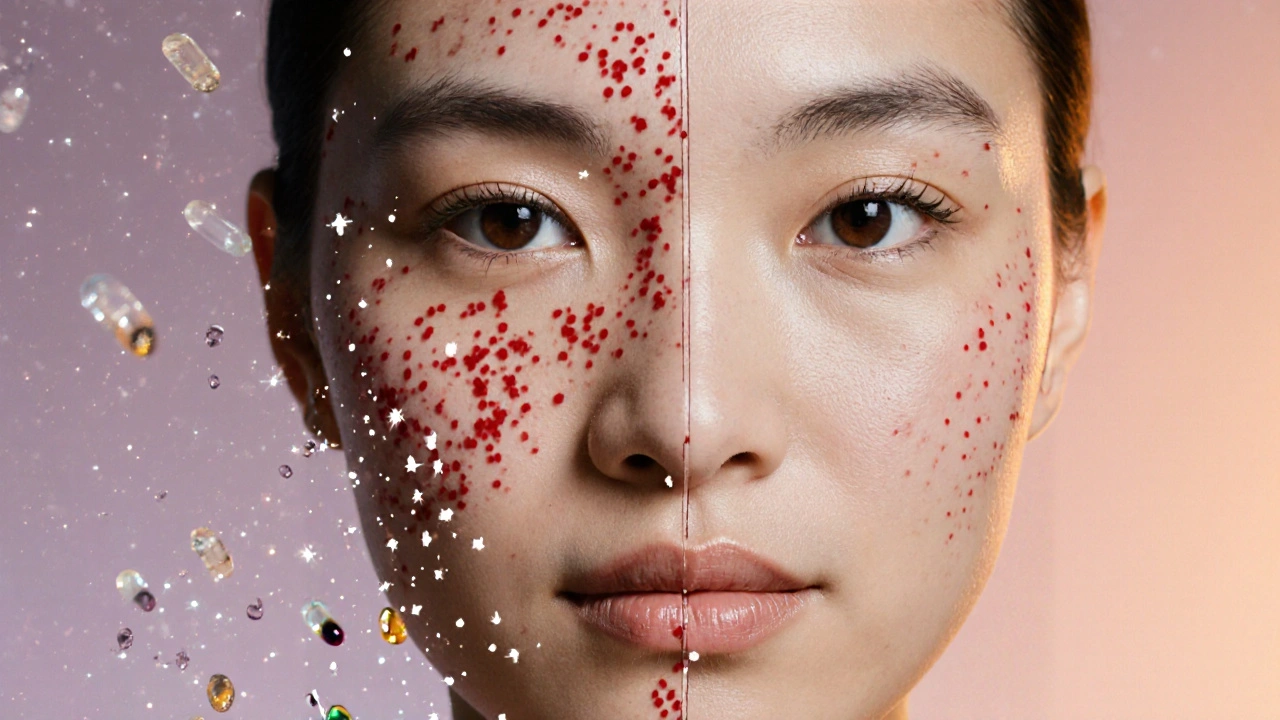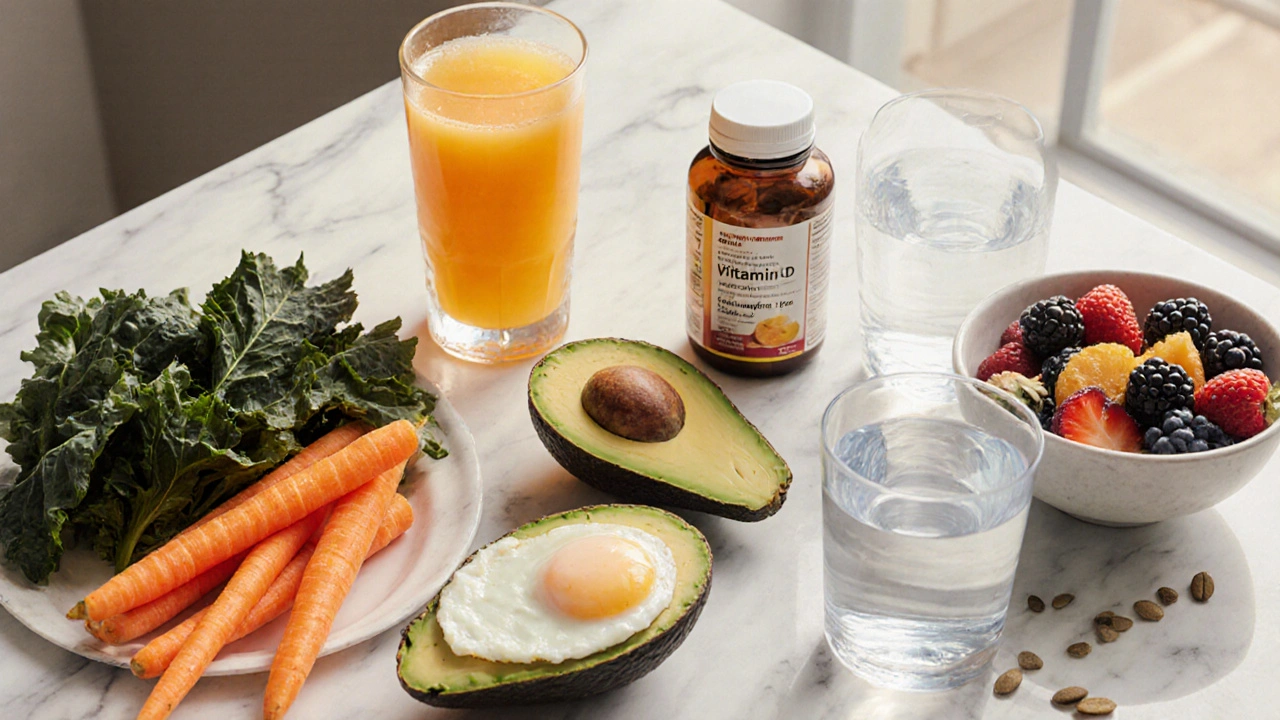Acne-Fighting Supplement Selector
Recommended Supplements for Your Skin
Struggling with stubborn breakouts? You’re not alone-acne tops the list of skin concerns for teens and adults alike. While topical products help, the right nutrients can work from the inside out, giving you a smoother canvas faster than you might think. Below is a no‑fluff guide that pinpoints exactly which vitamins and supplements truly support a clear complexion, how to take them safely, and which combos deliver the biggest bang for your buck.
Why Nutrition Matters for Skin
Skin is the body’s largest organ, and its health reflects what fuels it. Nutrients act as messengers, regulators, and builders. For example, Vitamin A is a fat‑soluble vitamin that promotes cell turnover and reduces oil production-two key factors that keep pores clear. Meanwhile, Zinc is a trace mineral that modulates inflammation and supports immune function, helping to calm those red, irritated spots. When you pair the right nutrients, you’re essentially feeding your skin the building blocks it needs to repair, renew, and stay balanced.
Core Vitamins & Minerals That Combat Acne
- Vitamin D a fat‑soluble vitamin that regulates skin cell growth and reduces inflammatory cytokines. Studies from 2023 show that deficient adults are up to 30% more likely to develop moderate acne.
- Niacinamide (Vitamin B3) helps strengthen the skin barrier, reduces sebum output, and lightens post‑acne marks. A double‑blind trial in 2022 found a 45% reduction in lesion count after eight weeks of 500mg daily.
- Omega‑3 Fatty Acids essential polyunsaturated fats that lower systemic inflammation and may decrease acne severity. EPA and DHA from fish oil have been linked to fewer inflammatory lesions in several meta‑analyses.
- Probiotics live bacterial cultures that balance gut microbiota, indirectly influencing hormonal and immune pathways tied to breakouts. Strains such as Lactobacillusrhamnosus GG show promise in cutting acne lesions by up to 20%.
- Selenium a trace element that works with antioxidant enzymes to protect skin cells from oxidative stress. Low selenium levels have been correlated with higher acne prevalence in young adults.
- Collagen Peptides hydrolyzed protein fragments that boost dermal matrix production and improve skin elasticity. While not a direct acne killer, they help heal post‑acne scarring and maintain barrier integrity.
Best‑In‑Class Supplement Picks (2025)
| Product | Key Ingredient | Daily Dose | Clinically Proven Benefit | Approx. Monthly Cost (USD) | Best For |
|---|---|---|---|---|---|
| ClearSkin Complex | VitaminA (Beta‑Carotene) + Zinc | 5000IU + 30mg | Reduces lesion count by 38% (12‑week study) | 25 | Moderate to severe acne |
| Omega‑Aid Ultra | EPA/DHA 1200mg | 1200mg | Decreases inflammatory lesions by 22% | 30 | Inflammatory/pustular acne |
| Biotic Boost | Lactobacillusrhamnosus GG (10B CFU) | 1 capsule | Improves skin barrier, cuts lesions 20% | 22 | Gut‑related breakouts |
| Niacinamide Plus | Niacinamide 500mg | 500mg | 40% reduction in oiliness, lighter spots | 18 | Oily skin & post‑acne marks |
| Collagen Glow | Hydrolyzed Collagen 10g | 10g | Improves elasticity, speeds scar remodeling | 27 | Scarring & loss of firmness |
How to Build a Daily Routine That Works
- Morning: Take a VitaminD softgel (1000IU) with breakfast. Sun exposure helps natural synthesis, but a supplement ensures consistency year‑round.
- Mid‑day: Consume your Omega‑3 capsule alongside a healthy fat source (e.g., avocado or olive oil) to boost absorption.
- Evening: Pair a probiotic capsule with dinner, preferably after a fiber‑rich meal to feed the good bacteria.
- Before bed: If you’re targeting barrier repair, dissolve a scoop of collagen peptides in warm water or a nighttime smoothie.
Spacing doses reduces competition for absorption pathways. For instance, zinc can interfere with copper uptake if taken at the same time as high‑dose iron, so keep zinc separate from multivitamins.
Safety First: Dosage & Possible Interactions
Even natural nutrients can cause trouble when over‑consumed. Here are the safe upper limits you should respect:
- VitaminA: Do not exceed 10,000IU daily unless prescribed, as excess can lead to liver stress.
- Zinc: Keep under 40mg per day; higher amounts may suppress immune function.
- Niacinamide: Up to 1,000mg is well‑tolerated, but doses above 2,000mg can cause flushing.
- Omega‑3: 3g/day is considered safe; higher intake may affect blood clotting.
- Probiotics: Generally safe, but immunocompromised individuals should consult a doctor.
If you’re on medication-especially isotretinoin, antibiotics, or hormonal birth control-check with a healthcare professional before adding high‑dose zinc or vitaminA, as interactions can affect efficacy or increase side effects.
Lifestyle Tweaks That Amplify Supplements
Nutrition alone isn’t a miracle cure. Pairing supplements with these habits maximizes results:
- Hydration: Aim for at least 2L of water daily to help kidneys flush excess minerals.
- Low‑glycemic diet: Cutting sugary spikes reduces insulin spikes that can trigger excess sebum production.
- Stress management: Cortisol spikes can worsen acne; practice 10‑minute mindfulness sessions.
- Consistent sleep: 7‑9 hours supports skin regeneration cycles.
When you combine these habits with your chosen clear skin regimen, you’ll notice fewer breakouts and smoother texture within weeks.

Common Pitfalls and How to Dodge Them
- Chasing trends: Not every “viral” supplement has science behind it. Stick to the nutrients listed above, which have peer‑reviewed evidence.
- Skipping the loading phase: Some minerals (like zinc) need a few weeks to build tissue stores before you see visible change.
- Ignoring dosage timing: Fat‑soluble vitamins (A, D) are best with meals containing healthy fat; water‑soluble ones (B‑vitamins) work fine on an empty stomach.
- Over‑supplementing: More isn’t always better. High doses can cause hormonal imbalances that actually worsen acne.
Quick Cheat Sheet: Your Daily Nutrient Blueprint
- VitaminA: 5,000IU (beta‑carotene) - with breakfast
- VitaminD: 1,000IU - with breakfast
- Zinc: 30mg - with lunch
- Niacinamide: 500mg - with lunch or dinner
- Omega‑3 (EPA/DHA): 1,200mg - with lunch
- Probiotic (L.rhamnosus GG): 10B CFU - with dinner
- Collagen peptides: 10g - before bed
Adjust based on personal tolerance, but keep the schedule consistent for at least eight weeks to evaluate true effectiveness.
Frequently Asked Questions
Can I get these nutrients from food instead of supplements?
Absolutely. Fatty fish, eggs, leafy greens, nuts, and fermented foods provide many of the same vitamins and minerals. However, achieving therapeutic levels often requires concentrated doses that are hard to reach through diet alone, especially for busy lifestyles.
How long does it take to see clearer skin?
Most users notice a reduction in new lesions within 4‑6 weeks, but full results-like fading post‑acne marks-can take 8‑12 weeks of consistent use.
Are there any side effects I should watch for?
High doses of VitaminA can cause liver strain; excess zinc may lead to copper deficiency and a metallic taste. If you experience stomach upset, rash, or unusual fatigue, cut back the dose and consult a healthcare professional.
Can I combine these supplements with my current acne medication?
In most cases yes, but certain combos-like high‑dose zinc with oral antibiotics-may reduce absorption. Always run a quick check with your dermatologist, especially if you’re on isotretinoin.
Do I need to take a break from supplements?
A 2‑week pause every 3‑4 months helps prevent nutrient buildup and allows your body’s natural regulation to reset. Cycle breaks are especially useful for trace minerals like zinc.



Comments
Vitamin A, D, and zinc constitute a trinity of dermatological support; Vitamin A accelerates keratinocyte turnover while Vitamin D modulates inflammatory pathways, and zinc fortifies immune resilience. To optimise absorption, administer the fat‑soluble vitamins with a breakfast containing healthy lipids such as avocado or olive oil. Zinc should be taken separately from copper‑rich foods to avoid competitive inhibition. A daily regimen that respects timing and dosage can yield discernible improvement within six to eight weeks.
Behold the ultimate chronicle of acne‑fighting alchemy, a saga that unfolds with the gravitas of a national epic and the sparkle of a Hollywood premiere 🎬🇺🇸. First, the noble Vitamin A appears, its beta‑carotene hue reminiscent of the sunrise over the Rockies, commanding the skin to shed its dead cells with regal authority. Next, Vitamin D strides in, a solar sentinel that steadies the inflammatory tempest like a seasoned general on the battlefield of the epidermis 😊. Zinc follows, a mineral champion that marshals the immune troops, quelling the fiery insurgents that threaten pore peace. Niacinamide, the unsung diplomat, negotiates a truce between sebum production and barrier integrity, delivering a calm, matte visage that would make any billboard proud. Omega‑3 fatty acids, harvested from the pristine waters of the Atlantic, descend like a fleet of peace‑keeping vessels, dampening systemic inflammation with each capsule 🚢. Probiotics, the microscopic peacekeepers of the gut, rally behind the scenes, ensuring that the hormonal tides remain steady and unthreathening. Collagen peptides, the architects of dermal scaffolding, reconstruct the war‑torn landscape of post‑acne scarring with the precision of a master mason. The temporal choreography of this regimen is as meticulously scripted as a Broadway overture: Vitamin A and D at dawn, zinc and niacinamide at high noon, omega‑3 at luncheon, probiotics at supper, and collagen at the twilight hour. Each dose is a stanza in this patriotic ode to clear skin, a declaration that the United States of Dermis stands unblemished. Moreover, the cost matrix-ranging from modest to premium-mirrors the democratic ideals of accessibility and excellence. Adhering to a disciplined schedule for eight weeks will witness the gradual erosion of lesions, akin to the slow but relentless march of progress across the plains. The scientific studies cited are as solid as the Constitution, with p‑values that echo the certainty of our founding fathers' resolve. Remember, over‑supplementation is a perilous rebellion; respect the upper limits lest your liver mutiny. Finally, celebrate each incremental improvement as one would a national holiday, for clear skin is the true emblem of liberty and confidence 🎉.
Oh joy another “miracle” pill list that promises flawless skin 🙄
Great job laying out a clear schedule, it’s like having a personal trainer for your skin. Pair the supplements with consistent sleep and hydration, and you’ll see the benefits compound over time. Remember to monitor for any irritation and adjust the timing if needed. Keep a simple journal to track progress, and stay motivated-you’ve got this!
Look mate the US made a powerhouse of a regimen that’d make any competitor jealous, especially the combo of Vitamin A and zinc that’s practically a patriot’s shield for the face. The dosage recommendations are spot on, but u should double‑check if you’re allergic to fish before takng the Omega‑3, even tho many folks think it’s a guaranteed win. The probiotic element adds a secret weapon from the gut, keepin the inflammation at bay. I definitely recomend sticking to the timing plan – breakfast for the fat‑soluble vitamins, lunch for the minerals, dinner for the gut‑goodies, and bedtime for collagen – that way it runs smoother than a well‑oiled engine.
Canada’s diverse culinary heritage offers many natural sources for these nutrients, such as wild‑caught salmon for omega‑3s and fortified dairy for vitamin D. Incorporating maple‑glazed oats can provide a tasty vehicle for zinc without compromising flavour. While supplementing, consider the seasonal shift in sunlight that influences endogenous vitamin D synthesis, especially during our long winters. Balancing traditional foods with targeted supplements creates a harmonious approach to skin health.
Big pharma loves the idea that a simple vitamin can fix a complex condition, so they flood the market with gimmicks. Yet the studies referenced here cut through the noise and actually show measurable benefits. Stay skeptical of the hype but trust the data when it aligns with solid physiology.
I’m thrilled to see a community rallying around evidence‑based skin care, and I want to add a few extra pointers to keep the momentum alive. First, consistency is the cornerstone; even the most potent supplement will falter without a regular intake schedule. Second, synergistic combinations amplify results-pairing zinc with a modest copper dose prevents mineral imbalance while enhancing antioxidant capacity. Third, quality matters; opt for third‑party tested products to avoid contaminants that could derail progress. Fourth, listen to your body; if you notice mild stomach upset, consider taking the capsule with a larger meal or splitting the dose. Fifth, remember that lifestyle factors such as stress reduction, adequate sleep, and a low‑glycemic diet act as force multipliers for the nutrients you’re ingesting. Sixth, a short break after three months can reset homeostatic mechanisms and maintain long‑term efficacy. Seventh, keep a simple log of breakout frequency and severity to quantify improvement objectively. Eighth, celebrate small victories-fewer new lesions, smoother texture, or a reduction in redness-because motivation fuels adherence. Lastly, share your successes and setbacks with fellow members; collective wisdom accelerates everyone’s journey toward clearer skin.
Well, I skimmed the list and it looks pretty standard, nothing groundbreaking really. If you already eat a balanced diet, you might not need every single supplement mentioned. Some of the pricey brands probably just cash in on the acne hype. Still, it’s a decent starting point for folks who feel lost.
Promoting supplement regimens without acknowledging potential socioeconomic barriers is ethically questionable. While the guide is thorough, it assumes accessibility that many readers simply cannot afford. Moreover, endorsing high‑dose vitamins without a medical disclaimer skirts responsible health communication. A more balanced discourse would weigh both benefits and risks, especially for vulnerable populations.